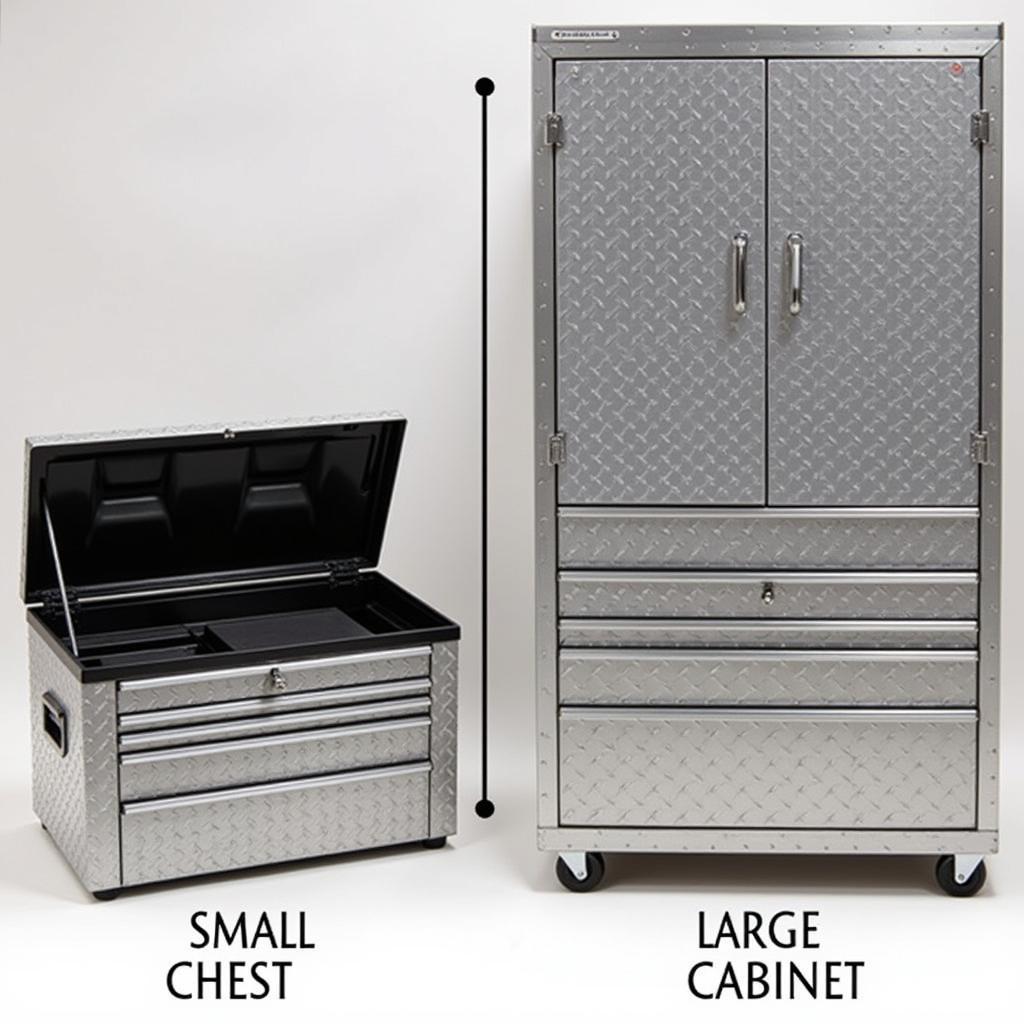Finding the right car tool chest involves many considerations, and weight is a crucial factor. How Much Does A Car Tool Chest Weigh? Well, that depends on various factors like size, material, and the tools inside. We’ll explore everything you need to know about car tool chest weight, from the smallest portable kits to the largest rolling cabinets.
Factors Affecting Car Tool Chest Weight
The weight of a car tool chest isn’t a fixed number. Several key factors contribute to the overall heft:
- Size: A larger chest naturally weighs more than a smaller one, even when empty. Consider your storage needs and available space.
- Material: Tool chests are typically made of steel or plastic. Steel chests are more durable and heavier, while plastic offers a lighter, more budget-friendly option.
- Tools Included: This is the most significant factor. A fully loaded chest with heavy-duty tools will be substantially heavier than an empty one or one with just a few basic tools.
Choosing the right weight depends on your individual needs and circumstances. Do you need a portable chest for quick fixes on the go, or a robust stationary unit for your garage?
 Car Tool Chest Weight Comparison: Portable vs. Rolling Cabinet
Car Tool Chest Weight Comparison: Portable vs. Rolling Cabinet
Different Types of Car Tool Chests and Their Average Weights
Let’s look at common car tool chest types and their approximate weight ranges:
- Portable Tool Boxes: These lightweight options, often made of plastic, typically weigh between 5 and 15 pounds empty. They’re perfect for carrying essential tools for roadside emergencies or minor repairs.
- Small Rolling Tool Chests: Offering more storage than portable boxes, these chests typically weigh between 30 and 50 pounds empty. The added wheels make them easier to move around a garage or workshop.
- Large Rolling Tool Cabinets: These heavy-duty units are designed for serious mechanics and can weigh anywhere from 100 to 300 pounds empty. Their robust construction and ample storage make them a worthwhile investment for professional use.
- Combination Sets: This option provides a balance between portability and storage. It includes a large chest with a smaller, detachable top chest, offering flexibility and weight distribution. The average combined weight is usually between 70-150lbs.
Remember these are just estimates. The actual weight will vary depending on the specific brand and model.
How to Choose the Right Weight for Your Needs
Choosing the right car tool chest weight involves considering several key factors:
- Portability: If you need to frequently move your tool chest, a lighter option is essential.
- Storage Capacity: The more tools you need to store, the larger and heavier the chest will likely be.
- Physical Capabilities: Be realistic about how much weight you can comfortably lift and maneuver. A heavy chest might be impractical if you have physical limitations.
Tips for Managing a Heavy Car Tool Chest
If you opt for a heavier tool chest, consider these tips for safe and efficient management:
- Use proper lifting techniques: Always lift with your legs, not your back, to avoid injury.
- Consider a tool chest with high-quality wheels: This will make maneuvering the chest much easier.
- Organize your tools effectively: Knowing where each tool is located will reduce the time you spend rummaging through a heavy chest.
- Distribute weight evenly: Avoid overloading one side of the chest, which can make it unstable and difficult to move.
Conclusion
So, how much does a car tool chest weigh? As we’ve explored, the answer depends on various factors. By carefully considering your needs, you can choose a car tool chest with the ideal weight and functionality. Remember to prioritize safety and proper lifting techniques, especially when dealing with heavier chests. Choosing the right tool chest will enhance your efficiency and make any car repair task more manageable.
FAQ
- What is the lightest type of car tool chest? Portable tool boxes are typically the lightest option.
- What is the heaviest type of car tool chest? Large rolling tool cabinets are the heaviest, often exceeding 300 pounds when fully loaded.
- What material is best for a car tool chest? Steel is more durable and heavier, while plastic is lighter and more affordable.
- How can I avoid injury when lifting a heavy tool chest? Always use proper lifting techniques, engaging your legs and keeping your back straight.
- What are the benefits of a rolling tool chest? Rolling chests are easier to move than stationary ones, especially when fully loaded.
- How can I organize my tools inside a heavy car tool chest? Use drawer organizers and labels to keep your tools neatly arranged and easily accessible.
- Where can I find diagnostic testing for cars near me? Check out our resources on diagnostic testing for cars near me.
Common Scenarios and Questions
- Scenario: A DIYer needs a tool chest for occasional home repairs and roadside emergencies. Question: What weight range and type of tool chest would be best? A portable tool box or a small rolling chest weighing under 50lbs would be suitable.
- Scenario: A professional mechanic needs a tool chest for daily use in a workshop. Question: What type of tool chest is recommended? A large rolling tool cabinet provides ample storage and durability for frequent use.
- Scenario: Someone with physical limitations needs a tool chest for light repairs. Question: What features should they look for? Prioritize lightweight materials, smooth-rolling wheels, and perhaps a combination set with a detachable top chest for easier handling.
Further Reading and Related Resources
For more information about car diagnostics and repair, explore these resources on our website:
- Find local car repair services: diagnostic testing for cars near me.
Need help with your car diagnostic needs? Contact us via WhatsApp: +1(641)206-8880, Email: [email protected], or visit us at 910 Cedar Lane, Chicago, IL 60605, USA. Our customer service team is available 24/7.

Leave a Reply